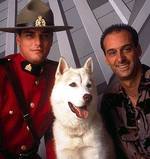I’ve been scarce around here the last few days because I am up in Seattle for some booksignings. I kicked off the trip speaking to the students at Jackson High School in Mill Creek, where I was bombarded with questions about writing books and TV shows (special thanks to school librarian Barbara Stoltzenberg and her terrific staff. I’ve never seen a nicer high school library). I have to admit there were a few quaestions that caught me by surprise, like "What kind of car do you drive?" and "does your wife look like Jessica Alba." It was a lot of fun, but after talking to hundreds of students over an entire school day, I had almost no voice left. (Did I mention it’s freezing up here? They are experiencing this thing called Winter. I’ve encountered winter a couple of times in my life before. I am so glad we don’t have it in L.A.)
Afterwards, my Uncle Stan Barer took my brother Tod and I to the Sonics game, where we had floor seats so close to the action we got to see the beads of sweat on every player. It was also fun watching the millionaires fight over the inadequate supply of free chocolate chip cookies in the VIP room at half-time. I’ll post some pictures from my Jack Nicholson-esque perch when I return to L.A.
This morning it’s off to the Seattle Mystery Bookstore and Barnes & Noble University Village to sign books, meet some friendly readers, and do the humanitarian work that allows me to write this trip off my taxes. The Seattle newspaper listings about the signings have amused me and irritated Tod — one read something like "Lee Goldberg will be signing his books MAN WITH THE IRON ON BADGE and DIAGNOSIS MURDER: THE PAST TENSE with his brother" and didn’t even mention his name. I had nothing to do with it. Honest.





